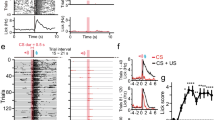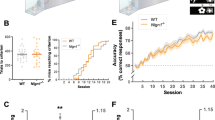Abstract
present research examined the role of hippocampal NMDA-dependent synaptic potentiation on appetitive instrumental conditioning under a continuous reinforcement schedule. In the first experiment, low (.025 mg.kg) or moderate (.05 mg/kg) dosages of the NMDA receptor antagonist, MK801, failed to increase the number of training days required to reach acquisition criterion; number of training days required to reach criterion for extinction were also unaffected. In the second experiment, a higher dosage (.10 mg/kg) of MK801 or induction of long-term potentiation failed to alter the number of responses occurring during acquisition. These data suggest that hippocampal synaptic potentiation does not play a prominent role in instrumental learning with simple contingency conditions. It is suggested that hippocampal LTP reflects a perceptual process that contributes differentially to spatial cognition, classical and instrumental conditioning.
Similar content being viewed by others
References
Berger, T.W. (1984). Long-term potentiation of hippocampal synaptic transmission affects rate of behavioral learning. Science, 224, 627–630.
Bliss, T.V.P. & Garner-Medwin, A.R. (1973). Long-lasting potentiation of synaptic transmission in the dentate area of the unanesthetized rabbit following stimulation of the perforant path. Journal of Physiology, 232, 357–374.
Brown, T.H., Chapman, P.F., Kairiss, E.W. & Keenan, C.L. (1988). Long-term synaptic potentiation. Science, 242, 724–728.
Clark, C.V. & Isaacson, R.L. (1965). Effect of bilateral hippocampal ablation on DRL performance. Journal of Comparative and Physiological Psychology, 59, 137–140.
Collinridge, G.L., Kehl, S.J. & McLennan, H. (1983). Excitatory amino acids in synaptic transmission in the Schaffer collateral-commissural pathway of the rat hippocampus. Journal of Physiology, 334, 33–46.
Cox, J., Guthrie, R., Macrae, M. & Kehoe, E.J. (1994). MK801 impairs acquisition and expression of conditioned responses in the rabbit nictitating membrane preparation. Psychobiology, 22, 156–166.
Eichenbaum. H. & Otto, T. (1992). The hippocampus: What does it do? Behavioral and Neural Biology, 57, 2–36.
Keith, J.R. & Rudy, J.W. (1990). Why NMDA receptor dependent long-term potentiation may not be a mechanism of learning and memory: Reappraisal of the NMDA receptor blockade strategy. Psychobiology, 18, 251–257.
Korol, D.L., Abel, T.W., Church, L.T., Barnes, C.A. & McNaughton, B.L. (1993). Hippocampal synaptic enhancement and spatial learning in the Morris swim task. Hippocampus, 3, 127–133.
Marages, W.F., Penney, J.B. & Goingh, A.B. (1988). Anatomic correlations of NMDA and [3H]-TCP labelled receptors in rat brain. Journal of Neuroscience, 8, 493–501.
O'Keefe, J. & Nadel, L. (1978). The Hippocampus as a Cognitive Map. Oxford; Clarendon Press.
Port, R.L., Mikhail, A.A. & Patterson, M.M. (1985). Differential effects of hippocampectomy on classical conditioning of rabbit nictitating membrane respnse related to interstimulus interval. Behavioral Neuroscience, 99, 200–208.
Port, R.L., Murphy, H.A. & Magee, R.A. (1996). Age-related impairment in instrumental conditioning is restricted to initial acquisition. Experimental Aging Research, 22, 73–81.
Robinson, G.B. (1992). Maintained saturation of hippocampal long-term potentiation does not disrupt acquisition of the eight-arm radial maze. Hippocampus, 2, 389–396.
Robinson, G.B. (1993). MK801 retards acquisition of a classically conditioned response without affecting conditioning related alterations in perforant path-granule cell synaptic function. Psychobiology, 21, 253–264.
Robinson, G.B., Port, R.L. & Berger, T.W. (1989). Kindling facilitates acquisition of discriminative responding but disrupts reversal of the rabbit nictitating membrane response. Behavioral Brain Research, 31, 279–283.
Robinson, G.B., Port, R.L. & Stillwell, E.J. (1993). Latent inhibition of the classically conditioned rabbit nictitating membrane response is unaffected by the NMDA antagonist MK801. Psychobiol. 21 (1993) 120–124.
Robinson, G.B. & Reed, G.D. (1992). Effect of MK801 on the induction and subsequent decay of long-term potentiation in the unanesthetized rabbit dentate gyrus. Brain Research, 569, 78–85.
Robinson, G.S., Crooks, G.B., Shinkman, P.G. & Gallagher, M. (1989). Behavioral effects of MK801 mimic deficits associated with hippocampal damage. Psychobiology, 17, 156–164.
Sanchez-Andres, J.V., Olds, J.L. & Alkon, D.L. (1993). Gated information transfer within the mammalian hippocampus: A new hypothesis. Behavioral Brain Research, 54, 111–116.
Schmaltz, L.W. & Isaacson, R.L. (1967). Effect of bilateral hippocampal destruction on the acquisition and extinction of an operant response. Physiology & Behavior, 2, 291–298.
Schmaltz, L.W. & Theios, J. (1972). Acquisition and extinction of a classically conditioned response in hippocampectomized rabbits. Journal of Comparative and Physiological Psychology, 79, 328–333.
Shapiro, M.L. & Caramanos, Z. (1990). NMDA antagonist MK801 impairs acquisition but not performance of spatial working and reference memory. Psychobiology, 18, 231–243.
Sharp, P.E., McNaughton, B.L. & Barnes, C.A. (1985). Enhancement of hippocampal field potentials in rats exposed to a novel complex environment. Brain Research, 339, 361–365.
Skelton, R.W., Scarth, A.S., Wilkie, D.M., Miller, J.J. & Phillips, A.G. (1987). Long-term increases in dentate granule cell responsivity accompanies operant conditioning. Journal of Neuroscience, 7, 3081–3087.
Solomon, P.R., Solomon, S.D., Vander Schaaf, E.V.&, Perry, H.E. (1983). Altered activity in the hippocampus is more detrimental to classical conditioning than removing the structure. Science, 220, 329–331.
Sutherland, R.J. & Rudy, J.W. (1989). Configurai association theory: The role of the hippocampus formation in learning, memory and amnesia. Psychobiology, 17, 129–144.
Weisz, D.J., Clark, G.A. & Thompson, R.F. (1984). Increased responsivity of dentate granule cells during nictitating membrane response conditioning in rabbit. Behavioral Brain Research, 12, 145–154.
Welzl, H., Berz, S. & Battig, K. (1991). The effects of the noncompetitive NMDA receptor antagonist MK801 on DRL performance in rats. Psychobiology, 19, 211–216.
Wong, E.H.F., Kemp, J.A., Priestley, T., Knight, A.R., Woodruff, G.N. & Iversen. L.L. (1986). The anticonvulsant MK801 is a potent N-methyl-D-aspartate antagonist. Proceedings of the National Academy of Sciences, 83, 7104–7108.
Author information
Authors and Affiliations
Rights and permissions
About this article
Cite this article
Port, R.L., Murphy, H.A., Miller, R.D. et al. Hippocampal synaptic plasticity during instrumental learning. Curr Psychol 15, 332–339 (1997). https://doi.org/10.1007/s12144-997-1010-3
Accepted:
Issue Date:
DOI: https://doi.org/10.1007/s12144-997-1010-3




